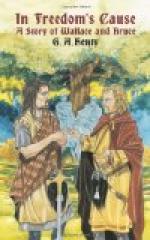Having made these arrangements, and taking with him one of the band as the first on duty above, he rejoined Wallace at his post on the craigs.
Wallace’s numbers now increased fast. On hearing of the fall of Lanark, and on the receipt of the proclamation calling upon all true Scotchmen to join him in his effort to deliver their country from its yoke, the people began to flock in in great numbers. Richard Wallace of Riccarton and Robert Boyd came in with such force as they could collect from Kyle and Cunningham, among whom were not less than 1000 horsemen. Sir John Grahame, Sir John of Tinto, and Auchinleck assembled about 3000 mounted troops and a large number of foot, many of whom, however, were imperfectly armed. Sir Ronald Crawford, Wallace’s uncle, being so close to Ayr, could not openly join him, but secretly sent reinforcements and money. Many other gentlemen joined with their followers.
The news of the fall of Lanark and of the numbers who were flocking to join Wallace paralysed the commanders of the English garrisons, and for a time no steps were taken against him; but news of the rising was instantly sent to King Edward, who, furious at this fresh trouble in Scotland, which he had deemed finally conquered, instantly commenced preparations for another invasion. A body of troops was at once sent forward from England, and, being strengthened by bodies drawn from all the garrisons, assembled at Biggar. The army was commanded by the Earl of Kent. Heralds were sent to Wallace offering him not only pardon but an honourable post if he would submit, but warning him that if he refused this offer he should, when taken, be treated as a rebel and hung.
Wallace briefly refused submission, and said that he should be ready to give battle on the following morning.
At daybreak the army set forth, divided into three parts. Wallace, with Boyd and Auchinleck, commanded one; Sir John Grahame, with Wallace of Riccarton, the second; Sir Walter of Newbigging, with his son David and Sir John Clinto, the third. The cavalry were placed in front. The footmen, being imperfectly armed and disciplined, and therefore unable to withstand the first charge of the English, followed the cavalry.
Before marching forward Wallace called the commanders round him and charged them earnestly to restrain their men from plunder until the contest was decided, pointing out that many a battle had been lost owing to the propensity of those who gained the first advantage to scatter for plunder. Just as the Scotch were moving, a body of 300 horsemen, well armed and equipped, from Annandale and Eskdale, led by Halliday, Kirkpatrick, and Jardine, joined them; and with this accession of strength they marched forward confidently against the enemy.




